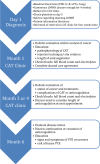Impact of a dedicated cancer-associated thrombosis service on clinical outcomes: a mixed-methods evaluation of a clinical improvement exercise
- PMID: 27895068
- PMCID: PMC5168504
- DOI: 10.1136/bmjopen-2016-013321
Impact of a dedicated cancer-associated thrombosis service on clinical outcomes: a mixed-methods evaluation of a clinical improvement exercise
Abstract
Objectives: Cancer-associated thrombosis (CAT) complex condition, which may present to any healthcare professional and at any point during the cancer journey. As such, patients may be managed by a number of specialties, resulting in inconsistent practice and suboptimal care. We describe the development of a dedicated CAT service and its evaluation.
Setting: Specialist cancer centre, district general hospital and primary care.
Participants: Patients with CAT and their referring clinicians.
Intervention: A cross specialty team developed a dedicated CAT service , including clear referral pathways, consistent access to medicines, patient's information and a specialist clinic.
Primary and secondary outcome measures: The service was evaluated using a mixed-methods evaluation , including audits of clinical practice, clinical outcomes, staff surveys and qualitative interviewing of patients and healthcare professionals.
Results: Data from 457 consecutive referrals over an 18-month period were evaluated. The CAT service has led to an 88% increase in safe and consistent community prescribing of low-molecular-weight heparin, with improved access to specialist advice and information. Patients reported improved understanding of their condition, enabling better self-management as well as better access to support and information. Referring clinicians reported better care standards for their patients with improved access to expertise and appropriate management.
Conclusions: A dedicated CAT service improves overall standards of care and is viewed positively by patients and clinicians alike. Further health economic evaluation would enhance the case for establishing this as the standard model of care.
Keywords: cancer associated thrombosis; mixed methods; patient journey; quality of life; service improvement.
Published by the BMJ Publishing Group Limited. For permission to use (where not already granted under a licence) please go to http://www.bmj.com/company/products-services/rights-and-licensing/.
Conflict of interest statement
SN served in the advisory boards of Leo Pharma and Pfizer and in the speakers bureau for Leo Pharma and Pfizer; no honorarium was received. RA served in the advisory boards of Pfizer, Leo Pharma, Bristol Myers Squibb and Bayer and in the speakers bureau for Leo Pharma, Pfizer and Bayer.
Figures
References
-
- Hutten BA, Prins MH, Gent M et al. Incidence of recurrent thromboembolic and bleeding complications among patients with venous thromboembolism in relation to both malignancy and achieved international normalized ratio: a retrospective analysis. J Clin Oncol 2000;18:3078–83. 10.1200/jco.2000.18.17.3078 - DOI - PubMed
Publication types
MeSH terms
Substances
LinkOut - more resources
Full Text Sources
Other Literature Sources
Medical
Research Materials
Miscellaneous

